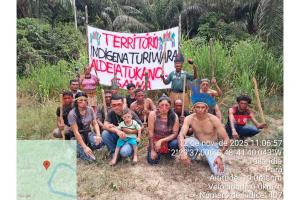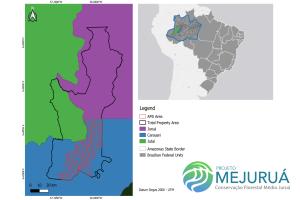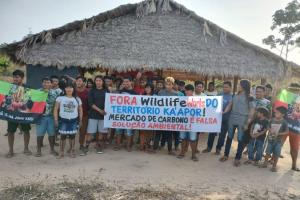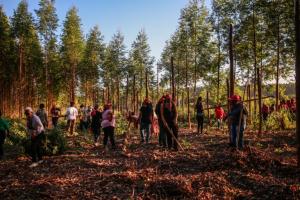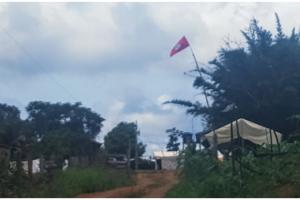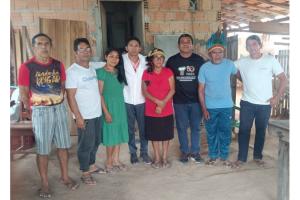In this video, a beekeeper denounces how the plantations of the Suzano company, one of the giants in the sector, are responsible for the death of his bees. The images were recorded in December 2025.
Brazil
Multimedia
11 February 2026
Articles
28 January 2026
A decisão favorece a permanência de 30 famílias indígenas no território, impedindo ações de despejo ou intimidação da empresa Agropalma na área ocupada, e reforça a competência federal para julgar conflitos envolvendo direitos indígenas.
Articles
21 January 2026
Uma decisão judicial acendeu o alerta de iminente episódio de violência no campo, no Pará. O Tribunal de Justiça do estado determinou a reintegração de posse da Fazenda Roda de Fogo, em decisão favorável à empresa Agropalma, autorizando o uso de força policial na ação de despejo de 30 famílias indígenas da Aldeia Tukano Sawa.
Action alerts
22 December 2025
Statement of condemnation regarding violations committed by BR Arbo Gestão Florestal and its REDD+ Mejuruá project in the state of Amazonas, Brazil
Bulletin articles
15 December 2025
The government of the Brazilian state of Pará – host of the COP30 climate conference – introduced an annual “Week of Awareness on the Importance of Carbon Credits”, the Indonesian government sets up a “Seller meets buyer” sales booth for carbon credits at the COP. These are the more visible signs of climate talks that are more concerned about creating business opportunities than halting the climate crisis.
Bulletin articles
15 October 2025
Whether they are in Brazil, amidst eucalyptus plantations, or in Thailand, surrounded by oil palm plantations, women suffer specific impacts from these monocultures. Women are on the frontlines of the resistance to these projects, which exploit and devastate the land in pursuit of profit. This is what two peasant activists fighting to defend the land – one from Brazil and one from Thailand – tell us.
Bulletin articles
24 June 2025
The following excerpts are from conversations we had with people who, despite living on different continents, have made the same choice: to live without electricity. Whether they live in the Indonesian archipelago or the Brazilian Amazon, their testimonies show that electricity is not an essential resource for human life. On the contrary, for these people, it is essential to do without it.
Action alerts
13 May 2025
Wildlife Works company (WWC) wants to carry out a carbon project in the Brazilian Amazon. But the Ka'apor indigenous people in resistance don’t want to turn nature into a commodity. Support this petition for the authorities to ban the company from operating in the Alto Turiaçu Indigenous Land.
Other information
23 April 2025
On the side-lines of the UN climate conference in 2023 in the United Arab Emirates, the government of Brazil introduced the “Tropical Forests Forever Facility” (TFFF). The fund, an idea initially thought up by the World Bank in 2018, is expected to be launched at the 2025 UN climate conference in the Amazon city of in Belem, in Brazil. Private sector and public investments and donations would provide the seed capital for financial managers to speculate on capital markets.
Articles
13 March 2025
WRM expresses its solidarity with the struggle of women from the Rural Landless Workers' Movement (MST) in Brazil. On this day, March 13, they are taking various actions across the country in favor of agrarian reform and against the multiple forms of violence perpetrated against women, under the slogan “Agribusiness means violence and environmental crimes. The struggle of women is against capital”. One of the actions is taking place in the state of Espírito Santo, where 1000 women have occupied an area belonging to Suzano.
Action alerts
28 February 2025
Solicitamos su solidaridad con el Movimiento de los Trabajadores Rurales Sin Tierra (MST), en Brasil, a través del envío urgente de una carta a las autoridades que se indican a continuación para que detengan el desalojo de unas 100 familias de un asentamiento del MST en el estado de Maranhão.
Other information
15 December 2024
Meticulous research conducted by the New Social Cartography of the Amazon Project in conjunction with traditional communities in the upper Acará River area over the course of five years has resulted in the dossier “Indígenas Turiwara Tembé no alto rio Acará: conflitos étnicos e territoriais”. This outstanding work describes in detail the history and resistance struggles of traditional communities in this part of Pará, proving that the Turiwara Tembé belong in the territory they have demanded for many years.


